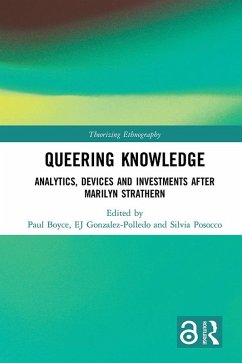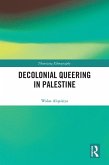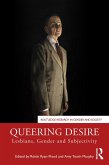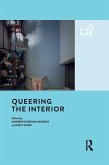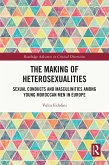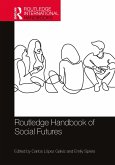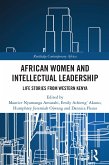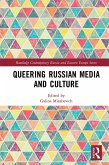Queering Knowledge (eBook, PDF)
Analytics, Devices, and Investments after Marilyn Strathern
Redaktion: Boyce, Paul; Posocco, Silvia; Gonzalez-Polledo, E. J.
0,00 €
0,00 €
inkl. MwSt.
Sofort per Download lieferbar

0 °P sammeln
0,00 €
Als Download kaufen

0,00 €
inkl. MwSt.
Sofort per Download lieferbar

0 °P sammeln
Jetzt verschenken
Alle Infos zum eBook verschenken
0,00 €
inkl. MwSt.
Sofort per Download lieferbar
Alle Infos zum eBook verschenken

0 °P sammeln
Queering Knowledge (eBook, PDF)
Analytics, Devices, and Investments after Marilyn Strathern
Redaktion: Boyce, Paul; Posocco, Silvia; Gonzalez-Polledo, E. J.
- Format: PDF
- Merkliste
- Auf die Merkliste
- Bewerten Bewerten
- Teilen
- Produkt teilen
- Produkterinnerung
- Produkterinnerung

Bitte loggen Sie sich zunächst in Ihr Kundenkonto ein oder registrieren Sie sich bei
bücher.de, um das eBook-Abo tolino select nutzen zu können.
Hier können Sie sich einloggen
Hier können Sie sich einloggen
Sie sind bereits eingeloggt. Klicken Sie auf 2. tolino select Abo, um fortzufahren.

Bitte loggen Sie sich zunächst in Ihr Kundenkonto ein oder registrieren Sie sich bei bücher.de, um das eBook-Abo tolino select nutzen zu können.
This volume draws on the significance of the work of Marilyn Strathern in respect of its potential to queer anthropological analysis and to foster the reimagining of the object of anthropology.
- Geräte: PC
- ohne Kopierschutz
- eBook Hilfe
- Größe: 5.45MB
Andere Kunden interessierten sich auch für
![Decolonial Queering in Palestine (eBook, PDF) Decolonial Queering in Palestine (eBook, PDF)]() Walaa AlqaisiyaDecolonial Queering in Palestine (eBook, PDF)42,95 €
Walaa AlqaisiyaDecolonial Queering in Palestine (eBook, PDF)42,95 €![Queering Desire (eBook, PDF) Queering Desire (eBook, PDF)]() Queering Desire (eBook, PDF)41,95 €
Queering Desire (eBook, PDF)41,95 €![Queering the Interior (eBook, PDF) Queering the Interior (eBook, PDF)]() Queering the Interior (eBook, PDF)39,95 €
Queering the Interior (eBook, PDF)39,95 €![The Making of Heterosexualities (eBook, PDF) The Making of Heterosexualities (eBook, PDF)]() Vulca FidoliniThe Making of Heterosexualities (eBook, PDF)41,95 €
Vulca FidoliniThe Making of Heterosexualities (eBook, PDF)41,95 €![Routledge Handbook of Social Futures (eBook, PDF) Routledge Handbook of Social Futures (eBook, PDF)]() Routledge Handbook of Social Futures (eBook, PDF)46,95 €
Routledge Handbook of Social Futures (eBook, PDF)46,95 €![African Women and Intellectual Leadership (eBook, PDF) African Women and Intellectual Leadership (eBook, PDF)]() African Women and Intellectual Leadership (eBook, PDF)42,95 €
African Women and Intellectual Leadership (eBook, PDF)42,95 €![Queering Russian Media and Culture (eBook, PDF) Queering Russian Media and Culture (eBook, PDF)]() Queering Russian Media and Culture (eBook, PDF)42,95 €
Queering Russian Media and Culture (eBook, PDF)42,95 €-
-
-
This volume draws on the significance of the work of Marilyn Strathern in respect of its potential to queer anthropological analysis and to foster the reimagining of the object of anthropology.
Dieser Download kann aus rechtlichen Gründen nur mit Rechnungsadresse in A, B, BG, CY, CZ, D, DK, EW, E, FIN, F, GR, HR, H, IRL, I, LT, L, LR, M, NL, PL, P, R, S, SLO, SK ausgeliefert werden.
Produktdetails
- Produktdetails
- Verlag: Taylor & Francis eBooks
- Seitenzahl: 218
- Erscheinungstermin: 28. August 2019
- Englisch
- ISBN-13: 9781315316475
- Artikelnr.: 57589100
- Verlag: Taylor & Francis eBooks
- Seitenzahl: 218
- Erscheinungstermin: 28. August 2019
- Englisch
- ISBN-13: 9781315316475
- Artikelnr.: 57589100
- Herstellerkennzeichnung Die Herstellerinformationen sind derzeit nicht verfügbar.
Paul Boyce is Senior Lecturer in the Anthropology and International Development at the University of Sussex, UK. He works at intersections of anthropological theory and global health research and is currently preparing a monograph - Sexualities, HIV and Ethnograpghy: Sexual Worldings and Queer Misrecognitions in India. His recent co-edited book is entitled Researching Sex and Sexualities. E.J. Gonzalez-Polledo is a lecturer in the Anthropology Department at Goldsmiths, University of London, UK. Gonzalez-Polledo's research interests encompass gender transition; health, the biosciences and biosociality; and digital infrastructures. Gonzalez-Polledo is currently developing two major research projects on synthetic biology and biohacking, and forensic bioinformation. Silvia Posocco is Senior Lecturer in the Department of Psychosocial Studies, Birkbeck, University of London, UK. Posocco's research focuses on gender, sexuality, violence, life and death. Current projects include a monograph on transnational adoptions circuits in the aftermath of war in Guatemala and new research on forensic biorepositories, bioinformation and evidence.
List of contributors; Acknowledgements; Introduction. Paul Boyce, E.J.
Gonzalez-Polledo and Silvia Posocco; Chapter 1. E.J. Gonzalez-Polledo: Wild
Gender; Chapter 2. Irene Peano: The (Im)possibilities of Transgression, or,
Reflections on the Awkward Relation between Strathern and Queer Politics;
Chapter 3. Antu Sorainen: Gay Back Alley Tolstoys and Inheritance
Perspectives: Re-Imagining Kinship in Queer Margins; Chapter 4. Hadley
Renkin: Partial Perversity and Perverse Partiality in Postsocialist
Hungary; Chapter 5. Paul Boyce: Properties, Substance, Queer Affects:
Ethnographic Perspective and HIV in India; Chapter 6. Hoon Song: Prefigured
"Defection" in Korea; Chapter 7. Silvia Posocco: Postplurality: An
Ethnographic Tableau; Chapter 8. Annelin Eriksen and Christine M. Jacobsen:
On Feminist Critique and How the Ontological Turn is Queering Anthropology;
Chapter 9. Conceptuality in Relation: Sarah Franklin in conversation with
Silvia Posocco, Paul Boyce, and E.J. Gonzalez-Polledo; Chapter 10.
Henrietta L. Moore: How Exactly Are We Related?; Index
Gonzalez-Polledo and Silvia Posocco; Chapter 1. E.J. Gonzalez-Polledo: Wild
Gender; Chapter 2. Irene Peano: The (Im)possibilities of Transgression, or,
Reflections on the Awkward Relation between Strathern and Queer Politics;
Chapter 3. Antu Sorainen: Gay Back Alley Tolstoys and Inheritance
Perspectives: Re-Imagining Kinship in Queer Margins; Chapter 4. Hadley
Renkin: Partial Perversity and Perverse Partiality in Postsocialist
Hungary; Chapter 5. Paul Boyce: Properties, Substance, Queer Affects:
Ethnographic Perspective and HIV in India; Chapter 6. Hoon Song: Prefigured
"Defection" in Korea; Chapter 7. Silvia Posocco: Postplurality: An
Ethnographic Tableau; Chapter 8. Annelin Eriksen and Christine M. Jacobsen:
On Feminist Critique and How the Ontological Turn is Queering Anthropology;
Chapter 9. Conceptuality in Relation: Sarah Franklin in conversation with
Silvia Posocco, Paul Boyce, and E.J. Gonzalez-Polledo; Chapter 10.
Henrietta L. Moore: How Exactly Are We Related?; Index
List of contributors; Acknowledgements; Introduction. Paul Boyce, E.J.
Gonzalez-Polledo and Silvia Posocco; Chapter 1. E.J. Gonzalez-Polledo: Wild
Gender; Chapter 2. Irene Peano: The (Im)possibilities of Transgression, or,
Reflections on the Awkward Relation between Strathern and Queer Politics;
Chapter 3. Antu Sorainen: Gay Back Alley Tolstoys and Inheritance
Perspectives: Re-Imagining Kinship in Queer Margins; Chapter 4. Hadley
Renkin: Partial Perversity and Perverse Partiality in Postsocialist
Hungary; Chapter 5. Paul Boyce: Properties, Substance, Queer Affects:
Ethnographic Perspective and HIV in India; Chapter 6. Hoon Song: Prefigured
"Defection" in Korea; Chapter 7. Silvia Posocco: Postplurality: An
Ethnographic Tableau; Chapter 8. Annelin Eriksen and Christine M. Jacobsen:
On Feminist Critique and How the Ontological Turn is Queering Anthropology;
Chapter 9. Conceptuality in Relation: Sarah Franklin in conversation with
Silvia Posocco, Paul Boyce, and E.J. Gonzalez-Polledo; Chapter 10.
Henrietta L. Moore: How Exactly Are We Related?; Index
Gonzalez-Polledo and Silvia Posocco; Chapter 1. E.J. Gonzalez-Polledo: Wild
Gender; Chapter 2. Irene Peano: The (Im)possibilities of Transgression, or,
Reflections on the Awkward Relation between Strathern and Queer Politics;
Chapter 3. Antu Sorainen: Gay Back Alley Tolstoys and Inheritance
Perspectives: Re-Imagining Kinship in Queer Margins; Chapter 4. Hadley
Renkin: Partial Perversity and Perverse Partiality in Postsocialist
Hungary; Chapter 5. Paul Boyce: Properties, Substance, Queer Affects:
Ethnographic Perspective and HIV in India; Chapter 6. Hoon Song: Prefigured
"Defection" in Korea; Chapter 7. Silvia Posocco: Postplurality: An
Ethnographic Tableau; Chapter 8. Annelin Eriksen and Christine M. Jacobsen:
On Feminist Critique and How the Ontological Turn is Queering Anthropology;
Chapter 9. Conceptuality in Relation: Sarah Franklin in conversation with
Silvia Posocco, Paul Boyce, and E.J. Gonzalez-Polledo; Chapter 10.
Henrietta L. Moore: How Exactly Are We Related?; Index
